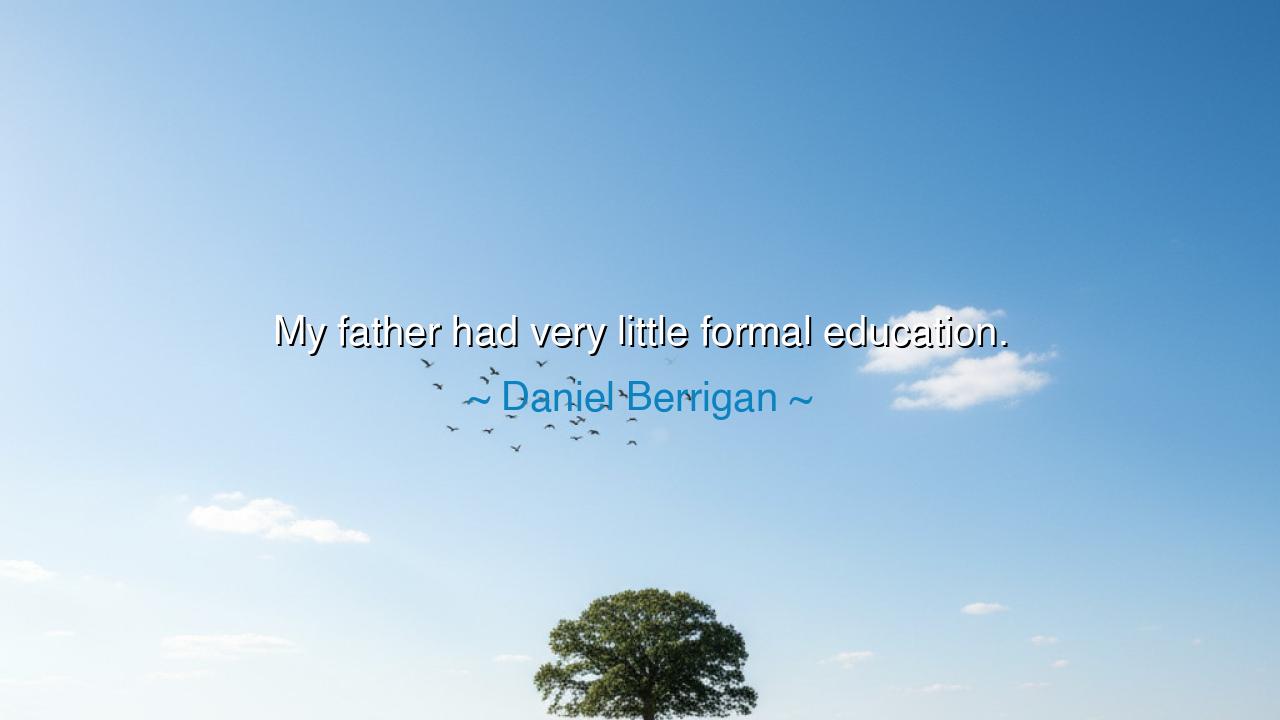
My father had very little formal education.






When Daniel Berrigan, the Jesuit priest, poet, and lifelong advocate for peace, said, “My father had very little formal education,” his words carried more than a simple statement of fact. They were a meditation on humility, wisdom, and the dignity of the unlearned. In his father’s lack of formal schooling, Berrigan did not see deficiency—he saw strength, courage, and quiet intelligence born not from books, but from life itself. His words remind us that education, though precious, does not alone define a person’s worth or wisdom. There is a deeper form of knowing—rooted in love, struggle, and experience—that no institution can grant and no degree can measure.
To understand the origin of this quote, one must look to Berrigan’s life and legacy. Born in 1921 in Minnesota, he grew up in a working-class family of Irish Catholic heritage. His father, Thomas Berrigan, was a laborer who toiled through hardship and disappointment, often wrestling with the limits of his opportunities. He had not walked the halls of great universities, nor sat beneath the lamps of scholars—but through his endurance, Daniel learned the meaning of perseverance, faith, and compassion. Later, as a priest and activist who would challenge governments and endure imprisonment for the sake of conscience, Berrigan carried with him the lessons not of the academy, but of the home: that true education begins in the human heart.
When Berrigan says his father “had very little formal education,” it is not lament—it is reverence. He is speaking the way the ancients might speak of the tiller of soil who, though illiterate, understands the seasons and the sacred rhythm of the earth. Formal learning shapes the mind, but life itself is the great teacher. His father may not have mastered Latin or philosophy, but he had mastered endurance, kindness, and the silent dignity of labor. These are lessons that no book can teach, yet they form the foundation upon which all human civilization stands. As the wise men of old would say, “He who listens to the winds and the cries of the poor learns more than he who reads a thousand scrolls.”
History, too, offers us examples that echo this truth. Consider Abraham Lincoln, born to a poor frontier family, whose own father, Thomas Lincoln, could barely write his name. Yet the wisdom of that humble man—his respect for toil, his belief in integrity, his trust in simple truths—was passed to his son, who would one day free millions. Or think of Sojourner Truth, who could neither read nor write, yet spoke with such power that her words shook the conscience of a nation. Like them, Berrigan’s father embodied the education of the soul, which teaches through life’s trials and moral clarity rather than through lectures and degrees.
Berrigan’s reflection also invites us to question what we truly mean by “education.” Modern society often measures knowledge by certificates and titles, forgetting that wisdom does not reside only in schools. There are those who, though they have studied little, see more clearly than the educated, because their vision has been shaped by struggle, by empathy, and by the nearness of suffering. There is a kind of intelligence in those who have endured—the farmer who knows the sky, the mother who understands sacrifice, the worker who senses the worth of his labor. These are not scholars of theory, but of life itself. And in their simplicity, they often carry truths that the learned overlook.
The moral fire of Daniel Berrigan’s words lies in their humility. He honors not only his father, but all those who have been denied access to learning yet carry wisdom in their hands and hearts. For Berrigan himself—an educated man who earned high regard in theology and literature—recognized that knowledge untempered by compassion becomes arrogance. He learned from his father that the measure of a person is not what they know, but what they do with what they know. The elder Berrigan’s “little formal education” became a symbol of purity—of learning that is not corrupted by vanity, but refined by hardship and faith.
Let this be the lesson for all who hear his words: Do not despise the unlettered, for they may hold the wisdom you seek. Honor those whose education came through labor and loss. Seek learning, but never forget that character is the highest form of knowledge. And when you speak of wisdom, remember that it often lives in silence—in the calloused hands of a parent, in the patience of the poor, in the steadfast heart of one who endures without recognition.
So, when Daniel Berrigan said, “My father had very little formal education,” he was not speaking of limitation, but of legacy. He was passing down the ancient truth that the mind learns through study, but the soul learns through life. The world may value the scholar, but it is the humble who teach us how to live. And thus, in honoring his father, Berrigan teaches us to honor all who, without privilege or prestige, carry the wisdom of humanity in their quiet, steadfast lives. For in the end, the true university is the world itself—and the greatest diploma is the love and courage we leave behind.






AAdministratorAdministrator
Welcome, honored guests. Please leave a comment, we will respond soon